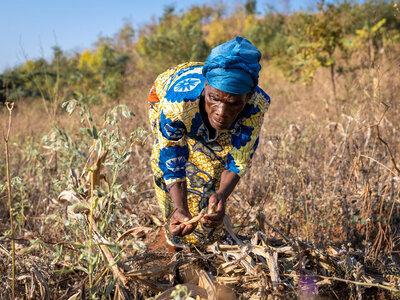Malawi
- Up to 3.5 million
- people are chronically food insecure
- Up to 40%
- of the population have been affected by El Niño
- 21 million
- population
Malawi is a small, landlocked country in sub-Saharan Africa with a rapidly expanding population. Most livelihoods depend on rain-fed agriculture, making the population highly vulnerable to disasters – particularly droughts and cyclone-induced floods.
The country faces cyclical food insecurity due to climate shocks. In February 2024, a long dry spell induced by El Niño affected 44 percent of the maize crop and left 5.7 million people acutely food insecure.
Millions are still struggling to recover from that ordeal, with families resorting to negative coping strategies like pulling children out of school to work or selling critical household assets.
The 2024 drought followed a series of disasters, including Tropical Storm Ana in 2022 and Tropical Cyclone Freddy in 2023. These challenges are exacerbated by weak economic growth, high debt, low primary school completion, high prevalence of stunting (impaired growth due to malnutrition) and a high HIV and AIDS infection rate.
While the World Food Programme (WFP) has preferred cash transfers over food distributions in recent years, the severity of shortages both in Malawi and the region has meant a shift to imported food.
In the 2024-2025 lean season response, WFP has reached 1.6 million people with food distributions and cash transfers.
Since September 2024, WFP and UNICEF, working with the Ministry of Health, have been supporting the treatment of malnutrition by providing therapeutic food. This targets children aged 6 to 59 months, pregnant and breastfeeding women, and people living with HIV and tuberculosis.
Over 39,700 people have been treated for moderate acute malnutrition (MAM) in seven districts, while more than 30,700 have received treatment for severe acute malnutrition (SAM) across Malawi, achieving 89 percent recovery rate for MAM patients and 91 percent for SAM patients.
What the World Food Programme is doing in Malawi
-
Food assistance
-
WFP supports the Government in responding to emergencies, by providing food and cash-based transfers, including to refugees. WFP also provides cash-based transfers to 58,000 refugees and asylum seekers in Dzaleka refugee camp, in partnership with UNHCR. WFP distributed over 38,500 metric tons of food and transferred US$3.3 million to people under the El Niño emergency response. This effort complemented the Government’s national response plan, supported by donor commitments. Food distributions included maize, malnutrition treatment (fortified cereal) and school meals, for around 1.6 million people.
-
School meals and nutrition
-
Livelihoods
-
Capacity strengthening
-
Supply chain services
Malawi news releases
Go to pagePartners and Donors
View allFind out more about the state of food security in Malawi
Visit the food security analysis pageOperations in Malawi
Contacts
Office
United Nations World Food Programme Family Dental Clinic, Area 14 Compound City Centre, P.O. Box 30571
Lilongwe
Malawi







